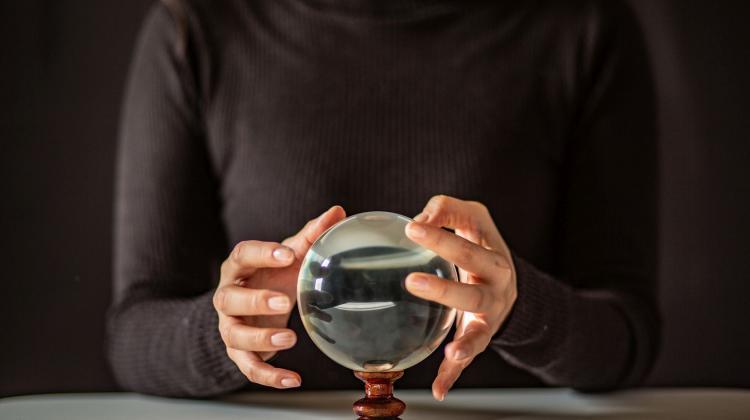The scientist shows the cards: Fortune tellers under the microscope
 Photo: Fotolia
Photo: Fotolia
Over half of the people in Poland admit to having used the services of fortune tellers at least once. Fortune tellers are effective practitioners of social influence. They are good at creating phrases that match one hundred percent of the population - says psychologist Prof. Tomasz Grzyb.
Prof. Tomasz Grzyb from the SWPS University in Wrocław specialises in the psychology of social influence. He is also interested in the methodology of psychological research, marketing and new technologies.
Science in Poland: What does fortune telling have to do with science?
Prof. Tomasz Grzyb: Psychologists and representatives of social sciences ask themselves: why do people do something? This is a scientific question. In this case, we reflect on the choice made by a person in a situation of uncertainty, internal conflict. If someone tries to make a decision based on the advice given by a fortune teller or a diviner, he gains something. He solves his problem. He believes that the information received from the fortune teller or diviner makes sense. He increases his +knowledge+ about a given problem. He makes decisions based on information he has obtained. And it does not matter whether this information is meaningful or meaningless.
SiP: Is this rational?
T.G.: We sometimes make completely irrational decisions in our lives. But the analysis - why do people make irrational decisions - is not any less scientific. Quite the opposite, from the scientific perspective this is an extremely interesting question: why do people prefer to make decisions that are irrational, but in their view beneficial. This question is posed not only by psychologists. Economist Richard Thaler, who received the Nobel Prize in 2017, showed that we can be led to make completely irrational decisions. (The researcher investigated the consequences of social behaviour and the impact of psychology on individual decisions, and consequently on financial markets - PAP)
SiP: Does that mean that making such a decision, even based on irrational premises, can free someone from the decision-making paralysis, from long-lasting doubts that torment this person?
T.G.: Imagine a man who faces a dilemma in life. He does not know which career path to choose. Or a woman who does not know whether she should start a relationship with a man. She begins to wonder. She thinks: "On the one hand - yes, because he is very handsome. On the other - no, because it seems that if he`s so handsome, he will cheat. Then again - he seems wealthy, so maybe yes? Or maybe not, because his wealth is rather doubtful, he is a freelancer and who knows what will happen in five years` time". There are a lot of different arguments that need to be considered. Making such a decision in rational categories seems to be extremely difficult.
And she goes to a fortune teller, the fortune teller will look at the cards and say "yes". Or she will say "no". What`s more, something that we call self-fulfilling prophecy will begin to work. Let`s say that the fortune teller advises against a relationship - but you think "the heart wants what it wants" and start the relationship anyway. Then, every situation that will require taking action to save the relationship will be a proof that the fortune teller was right and you should have listened to her advice. You should have made the suggested decision and have peace.
SiP: Who are fortune tellers for a scientist?
T.G.: Fortune tellers and diviners are very effective practitioners of social influence. I like to call them that, because they use certain patterns of human functioning and thinking. They present their divinations, their advice, in such a way that they will always come true.
SiP: Do fortune tellers and diviners use psychological knowledge?
T.G.: Let`s say a man wants to know something about himself. Find out what kind of a human being he is. We often have doubts as to what to think about ourselves. So, we come to see a fortune teller and the fortune teller says: "You are a very capable person, but you sometimes have problems showing how much you are really worth". Note that this phrase applies to one hundred percent of the human population. If someone tells you: "You have potential that has not turned into your advantages yet" or "Even though people think that you often make decisions dynamically and without thinking, in the depths of your mind you sometimes think a lot, you are worried whether the decision you have made is the right one". I could generate such sentences for infinity. Fortune tellers also have this ability. The charm of these sentences consists in the specific use of the words like "sometimes", "it happens".
If we look at the course of our life - whether we are 35, 40 or 50 years old - we can certainly recall a situation that will fit this "personality description", although of course it has nothing to do with an actual description of personality. Fortune tellers have a lot of practice in formulating such diagnoses. In this way they gain new customers , because "she told me exactly who I am".
SiP: Is there such a thing as telling a bad fortune?
T.G.: My tolerance for fortune tellers ends when people who are seriously ill come to them and ask for diagnosis or advice. And sometimes fortune tellers turn into amateur doctors and say: "You should stop the therapy and see doctor Zenia, who will also give you a mix of Tibetan herbs grown at 8,000 meters, which will make you healthy". We must clearly distinguish between buying certainty and advice and doing something irreversible, like persuading people to stop the treatment, change the doctor.
SiP: Do you see fortune tellers as part of scientific research?
T.G.: Researching fortune tellers is difficult. We have friendly fortune tellers who give us answers. We also analyse the reports of people who go to fortune tellers for advice.
SiP: Has this research subject brought scientifically surprising results?
T.G.: The ways of building authority, credibility are fascinating. A person who comes for such a service has many doubts. He or she often looks at the fortune teller with suspicion. Some of us, selected randomly, will hear: "I will not tell your fortune, I will not work with you, because I feel that you do not trust me". What does this mean? Well, of course it is a good person. Not someone who just wants to take your money, but someone who cares about you. The fortune teller did not even take the money for the meeting, she just said that once you think you can trust her, then you can come back and talk.
SiP: How many people in Poland use the advice of fortune teller?
T.G.: The scale of people who go to fortune tellers and people who provide divination services is huge in Poland. CBOS research shows that over 50% admit to having used the services of fortune tellers at least once. So - if you look around - more or less half of your friends and acquaintances believe that it is a good idea to see a fortune teller. It is not a small group of people that we could suspect of loosing their mind. You can obviously make jokes about it, because when you analyse various phone calls to fortune tellers, as many as one-third of the callers do it "for fun" and to try to provoke the fortune teller. But you must realize that fortune telling is actually popular.
SiP: Is there any other professional group that has a similar influence on people?
T.G.: I know that some of my environment will be offended, but I think that a significant part of the so-called coaches use similar mechanisms, although they would never admit it. But the phrases like: "You have to get out of your comfort zone. No one can be a better expert at being you than you alone" - they fit fortune tellers. And the influence that this group has seems similar from this perspective.
PAP - Science in Poland, Karolina Duszczyk
kol/ ekr/ zan/ kap/
tr. RL
Przed dodaniem komentarza prosimy o zapoznanie z Regulaminem forum serwisu Nauka w Polsce.
















